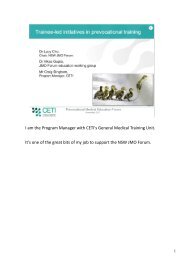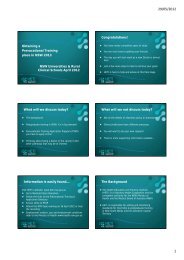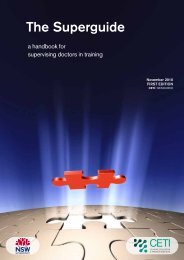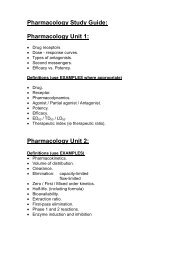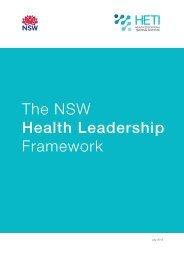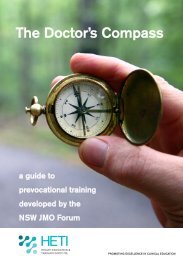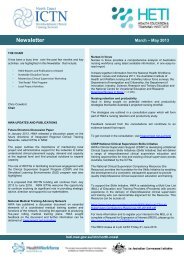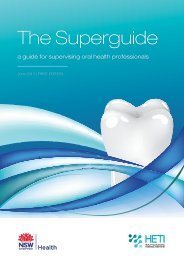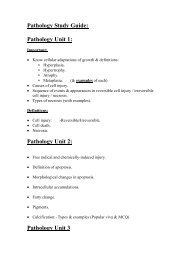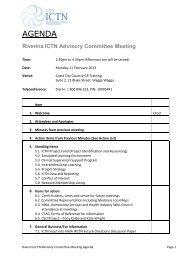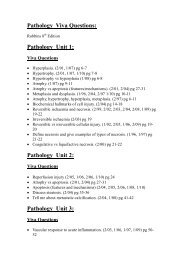a handbook for supervising allied health professionals - HETI - NSW ...
a handbook for supervising allied health professionals - HETI - NSW ...
a handbook for supervising allied health professionals - HETI - NSW ...
You also want an ePaper? Increase the reach of your titles
YUMPU automatically turns print PDFs into web optimized ePapers that Google loves.
THE SUPERGUIDE<br />
Managing <strong>for</strong> per<strong>for</strong>mance<br />
In <strong>allied</strong> <strong>health</strong> managing <strong>for</strong> per<strong>for</strong>mance is generally undertaken by the operational line<br />
manager, which may include a unit head, team leader, head of department or service<br />
manager. This may be the clinical supervisor if they are also the line manager. However,<br />
if the clinical supervisor is not also the line manager they may also be involved in this<br />
process. This provides an opportunity <strong>for</strong> collaboration to occur <strong>for</strong> the benefit of the<br />
supervisee.<br />
62<br />
“Managing <strong>for</strong> per<strong>for</strong>mance is a process that commences with the recruitment and<br />
orientation of an individual and involves an on-going cycle of planning, coaching and<br />
reviewing individual, work, team and organisational per<strong>for</strong>mance within the context of the<br />
organisation’s goals and strategies” (<strong>NSW</strong> Department of Health 2005a, p. 4).<br />
It is important to note that managing <strong>for</strong> per<strong>for</strong>mance is not disciplinary action but is about<br />
ongoing two way feedback to promote development. It also involves a <strong>for</strong>mal review often<br />
referred to as the annual per<strong>for</strong>mance review (<strong>NSW</strong> Health 2005a).<br />
The process of clinical supervision links into the <strong>for</strong>mal review as it is based on individual<br />
learning goals relating to clinical practice. These items can there<strong>for</strong>e be discussed in<br />
addition to the organisation/service requirements of the supervisee.<br />
If supervision has been effective throughout the year, there should be no surprises at the<br />
<strong>for</strong>mal review. The staff member should be well aware of the progress they have made<br />
and the opportunities <strong>for</strong> further improvement. This should be achieved through regular:<br />
• feedback on per<strong>for</strong>mance<br />
• review of learning goals<br />
• one-to-one supervision sessions to discuss progress and opportunities <strong>for</strong><br />
improvement<br />
• use of reflective practice to develop increased self awareness.<br />
Purposes of the <strong>for</strong>mal review<br />
• To provide staff members with feedback about their per<strong>for</strong>mance and facilitate their<br />
learning and development.<br />
• To review evidence that staff members are progressing and achieving their learning<br />
objectives. A good review system should assure senior staff/management that <strong>allied</strong><br />
<strong>health</strong> <strong>professionals</strong> are meeting certain standards of practice and competence<br />
be<strong>for</strong>e advancing to higher levels of responsibility.<br />
• To set objectives <strong>for</strong> the following year and identify areas <strong>for</strong> professional<br />
development in line with service needs and the staff member’s career aspirations.<br />
For more in<strong>for</strong>mation, please refer to the <strong>NSW</strong> Health Policy Directive, PD2005_180,<br />
Per<strong>for</strong>mance managing <strong>for</strong> a better practice approach <strong>for</strong> <strong>NSW</strong> Health 2005.



